Construction hoists - a new era of design
June 19, 2024
Summing up the market from his perspective, Alex Ventosa Lázaro, Sales Manager at Torgar, says new and modern architecture styles make access more complicated. “This forces hoist manufacturers like ourselves to look at collaborating with scaffold companies to help with the access, as well as common tower applications that help with efficiency and access.”
This also affects engineers as they need to be on top of calculations, with extra long ties or angled mast configurations, adds Lázaro. “A lot of the time, it takes precedence over the price or capacity of the machine, as projects can be awarded for the value in the solution rather than the machine itself.”
Another challenge in Europe, says Lázaro, is the improvement of Chinese machines. “It is seen most evidently in the tower crane sector but it is also apparent in the hoists.
“They are making formidable strides and are comparable to those we design here in Europe.”
Rising interest rates are another issue, adds Lázaro; “With the European manufacturers raising their costs it hard for our clients to make investments in new machinery.
On the product front Torgar is in the process of updating its range, such as the smaller transport platforms and a 3,200kg capacity goods passenger hoist. The features reflect the company’s philosophy of versatility and efficiency. “Thus, our manufacturing is focused on having one machine capable of serving a variety of different installations so that logistics and management of the hire user is minimal.”
On the inside
 Maber’s MBA2000 in action.
Maber’s MBA2000 in action.
As Diego Benneton, sales manager at Maber, points out, “Mechanically there’s not much to invent,” when it comes to hoists, except, “trying to make modular machines that are easy and robust.”
Add to that electronics. Maber hase been developing in-house electronics since 2010 and is now adept in remote monitoring.
However, the design of modern buildings with their curves and uneven edges, are a different matter, “Architects are making hoist producers’ lives more exciting. This is why we developed a hoist for lift shafts. When buildings become too complicated, the lift shaft can be the only access point.
Maber’s new MBA2225 - a high speed 2,200kg construction hoist for lift shafts, runs at 72 m/min, with cage dimensions of 1.3m x 2.5m to fit into 2m x 2.7m shafts.
Next up will be a new series of passenger and goods hoists with capacities from 2,000kg upwards and a new medium capacity mast climber.
“It’s a while since good medium mast climbers have been introducedin the market.” The unit will be in single mast configuration, 12m long’, 33m in twin.
Industry change
On the matter of architecture Raxtar says the rise of prefabrication and modular building techniques is changing the industry’s needs.
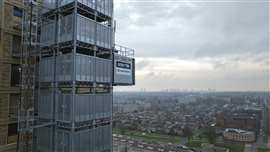 Raxtar’s latest common tower, the Lite model.
Raxtar’s latest common tower, the Lite model.
Raxtar has responded with the development of the RX Common Tower and RX Common Tower Lite.
The Common Tower is a unique modular logistical hub for use on high-rise construction sites. It was developed to help maximize the transport of people and materials while minimizing the footprint and the space required for building access.
It has recently been further developed into the Common Tower Lite. The Lite logistical hub is a modular system that has up to six standard hoists with a single entry into the building. Being a member of the manufacturer’s Smart Series, the RX Common Tower Lite fits in the mid-rise market for construction up to 150m.
One of the benefits is that it is easily adaptable to building shapes. Being a Lite version, it can also be used as a setback structure with runoffs up to 6m.
Expanding on the changing marketplace, Raxtar adds, “The market requires bigger, stronger, safer, and faster solutions to optimize speed and efficiency during the building process.”
This, says the company, pushed it to new frontiers, with new twin mast hoist cabins, offering a 4.650kg payload at 92m/min, without counterweight. The patented safety technology enables it to go further in size, payload and speed, than others on the market, said the company.
Raxtar’s latest Size Matters model, the RX4677SFT2, is being used at the new JP Morgan HQ in New York City, for example, bringing up curtain walls to 434m, or 60 floors.
Main features of the RX4677SFT2 are the 4,650kg payload, speed of 0-92 m/min and internal cabin size of 7729m x 1520m x 3560m.
Acquired solutions
Through the acquisition of Tractel in 2022, Alimak’s construction division has gained access to Scanclimber’s technical solutions. The acquisition has also strengthened Alimak’s geographic presence in North America and Europe.
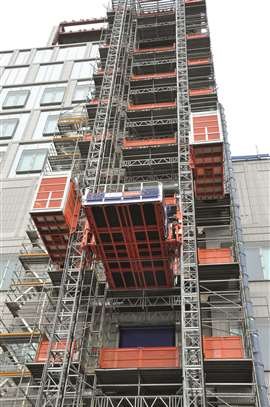 Alimak’s Vectio 650 in combination with two Alimak hoists.
Alimak’s Vectio 650 in combination with two Alimak hoists.
As such, Alimak’s latest construction hoist is the Medius 350, launched in January 2024.
The hoist has a compact, lightweight design which reduces energy consumption, leaving a smaller environmental footprint. It is easy to install and use across the whole construction period. The compact design also enables installation inside lift shafts.
It is compatible with Alimak’s Scando equipment and shares height components with the Alimak TPL transport platform.
The new construction hoist is digitally connected via My Alimak – the remote monitoring portal.
The Medius 350 has a capacity of 1,000kg, maximum height of 100m and travel speed of 24 m/min, with a car size of 1.5m x 1.6m.
The company will launch the Vectio 650 in the second quarter of this year, its largest transport platform with an astonishing size of up to 14.7 square metres and open design for wide and bulky goods, reducing the need for a tower crane. Platform size on a single mast is up to 7.35 sqm and twin mast up to 14.7 sqm. Travel speed is 12/24 m/min.
The company uses 100% renewable energy in manufacturing the uiit, which also offers a low step-in height of 0.4m and can be operated at high wind speeds up to 20m/s.
“In general,” says Alimak, “Global trends are urbanisation, digitalisation and sustainability, as well as increased focus on health and safety.
“Buildings are getting higher and more complex, which requires efficient vertical logistics. Large prefabricated pods, external cladding panels, or other bulky materials need to be transported efficiently and safely.”
The Vectio 650 transport platform has been developed to support that boom.
Customer initiative
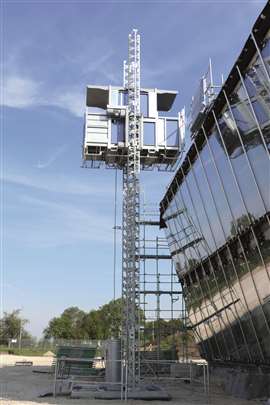 Geda’s 1500 Z/ZP F free standing transport platform
Geda’s 1500 Z/ZP F free standing transport platform
According to Geda, one of the main industry requirements is giving customers intuitive and simple ways to use more complex technology, which is required to deliver sophisticated features such as comfortable landings or to work more efficiently.
“Integrating new technologies, such as the Internet of Things (IoT) for better monitoring and maintenance, requires ongoing research and development, but also more skills on the service technician’s side or the end user´s side. On the other hand, complying with stringent safety standards and regulations is crucial, but sometimes gets in the way of innovating products.”
Guiding the industry
At the last Bauma, Geda presented a new transport platform, the 2500 Z/ZP. This extremely strong transport platform, up to 2500kg capacity, is guided by a single mast.
Another new product is the 1500 Z/ZP F. As a free-standing transport platform, it can also be operated without anchoring and opens up new possibilities for sectors such as façade construction.
The company has also expanded its Machine Management tool Geda Central, for operators to manage their fleet quickly and easily and support service teams.
Geda is set to launch an innovation tailored to the modern sector, although no details are available. In addition there will be the expansion of Geda Central.
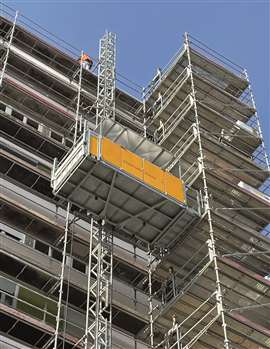 Electroelsa’s PM23 transport platform.
Electroelsa’s PM23 transport platform.
Returning to a previous point, Electroelsa expands on the state of modern architecture. “While architecture’s imagination is going crazy, a lot of contractors are forced to assemble hoists in the elevator shaft only.”
That said the company is focusing on its latest product, the Elsa PM23 transport platform, on a single mast, with four different cages transport platforms available. Loads range from 1500kg up to 2300kg for people and materials. Included is the fleet remote management system.
Next in the manufacturer’s line-up will be the Elsa PM56; a huge transport platform with up to 5 tonnes load capacity and working area of almost 15 sq meter, along with another new model, the Elsa H20-50 - a versatile hoist with a capacity of 2,000kg-5,000kg, depending on the configuration, and available with single or double cabin versions.
Modern renovation
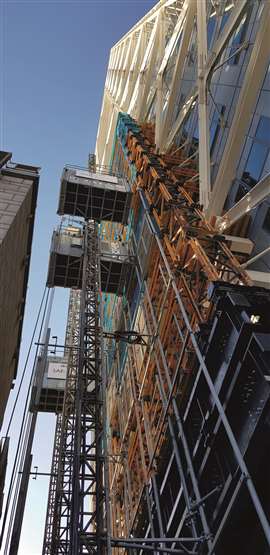 SAE Climber’s three twin E20 hoists at the Hotel Arts. SAE Climber’s three twin E20 hoists at the Hotel Arts.
The Iconic Hotel Arts in Barcelona hast just started being restored under the supervision of consulting company Arcadis. SAEclimber won the bid to provide access alongside rental company Grúas y Transportes Royma. SAEclimber is providing the project with three twin E20 passenger and material hoists. Hotel Arts is operated by the Marriott Hotel Group and designed by Bruce Graham. It is a symbol of Barcelona’s modern culture, with 44 stories of blue glass and exposed steel facing the seafront. It played an important role in the seafront infrastructure for the Olympic Games in 1992 and was renovated in 2016 and in 2022. For this new renovation, the E20 hoists have a height of 136m, with installation including the Saeclimber Pole system, to host the landing doors and make the erection more flexible and cost-effective than the usual standard way of landings. The proven E20 has up to 250m height, single or twin cage configuration, two tonnes per cage and a modular 3.2m long cabin, which can go up to 4.5m. Provided with large C door in aluminium for a smooth and easy opening, the E20 provides top of the range motors and inverters for a speed of 40m/min. |
STAY CONNECTED



Receive the information you need when you need it through our world-leading magazines, newsletters and daily briefings.
CONNECT WITH THE TEAM









